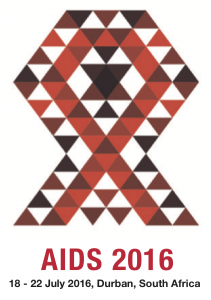Sub-Saharan African countries moving quickly to recommend “Treat All”
1 August 2016. Related: Conference reports, Treatment access, Guidelines, World AIDS 21 Durban 2016.

Polly Clayden, HIV i-Base
There is broad support for universal treatment of people with HIV among fast track countries, and many are committed to adopting “Treat All” policies by the end of this year, say researchers from the World Health Organisation (WHO). But challenges to full implementation remain.
Meg Doherty and colleagues from WHO HIV/Hepatitis department showed findings from a survey of country level adoption of Treat All policies recommended in the 2016 Consolidated Antiretroviral Guidelines, as a poster presentation at AIDS2016.
“Progress towards the ending the AIDS epidemic by 2030 depends on adoption and implementation of global guidelines to optimally treat all people living with HIV and knowing how best to deliver interventions, they wrote.
WHO has implemented a country intelligence database since 2013 to better follow policy and practice trends at country level.
The researchers showed data for 144 low- and middle-income countries (LMIC) and 35 fast track counties, to July 2016. They found that 24% of all LMIC and 40% of fast track countries have adopted Treat All. A further 31% of LMIC and 40% of fast track countries plan to do so by the end of 2016. They noted that only 6% of all LMIC had adopted Treat All one year ago.
They expect that by the end of 2016 more than half LMIC and 80% of fast track countries will have adopted Treat All. But they also note that implementation is just getting started and most countries have not yet put Treat All policies into practice.
Option B+ is almost universally adopted but is not yet fully implemented. By the end of the year the researchers predict 58% of LMIC and fast track countries will have adopted Treat All for children.
The majority (90%) of LMIC adopted efavirenz plus TDF and 3TC (or FTC) as the preferred first-line regimen. Almost half of LMIC (47%) have fully implemented routine viral load; 26% have partially implemented it.
The researchers wrote: “With the 2016 Consolidated ARV Guidelines, WHO has rapidly updated global guidance to reflect new science regarding the benefit of early HIV treatment. There is broad support for universal treatment among fast track countries and many are committed to adopting Treat All policies by the end of 2016”.
But implementation comes with challenges. And that the uptake of recommendations on task shifting, integration and decentralisation are lagging. They add that differentiated service models might be part of the solution as programmes expand.
Reference:
Doherty M et al. Uptake and implementation of the WHO 2015 consolidated ARV guidelines: progress towards TREAT ALL. AIDS2016. Durban, South Africa. 18-22 July 2016. Poster abstract THPEB057.
http://programme.aids2016.org/Abstract/Abstract/9337 (abstract)

